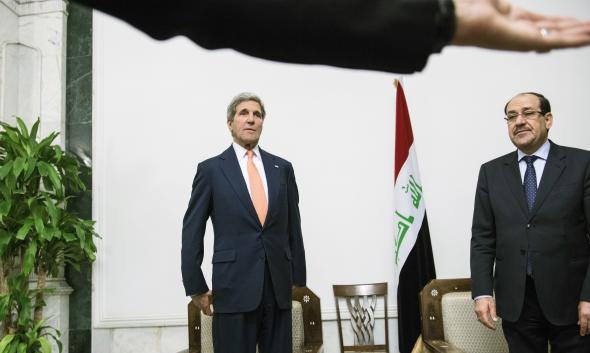Last September I blogged, in reference to the ongoing war in Syria, about a survey by Dutch political scientists Madeleine Hosli and Anke Hoekstra looking at how civil wars typically end. Generally, it’s not in a negotiated settlement: Between 1945 and 1993, 75 percent of civil wars ended in outright military victory by one side. But certain factors make diplomatic outcomes more likely, and they’re worth considering in light of John Kerry’s new push for Iraqi leaders to form a more inclusive government. Considering precedent, it seems at first that prospects for a negotiated settlement might actually be decent.
Negotiated settlements are more likely in situations of military stalemate. We appear to be approaching something like that in Iraq. Despite their recent gains in the north, where defenses were weak, at the moment it seems most likely, as Kenneth Pollack argues, that ISIS’s advance will be halted north of Baghdad, where it will run into more heavily fortified and more predominantly Shiite areas. Without major U.S. or Iranian military intervention—both of which seem unlikely—Iraqi security forces don’t seem particularly capable of launching a major counteroffensive. In other words, Iraq could be in for a long one.
Negotiation is also more likely to take place when there are more armed groups fighting. With the involvement of Iraqi armed forces, ISIS, Shiite militias, the Kurdish peshmerga, as well as Sunni militias and ex-Baathists whose current support for ISIS may be tenuous at best, it’s a crowded battlefield.
International intervention also tends to hasten the end of conflicts, though generally only in cases when only one side is receiving aid. As previously noted on this blog, almost everyone hates ISIS.
Writing at the blog Political Violence at a Glance, UC–San Diego’s Barbara Walter gives a few other data-driven reasons for optimism, including the fact that “Iraq now has relatively clear ethno-sectarian boundaries,” making territorial pacts easier. There’s also the fact that Nouri al-Maliki’s purely sectarian rule doesn’t work very well as a long-term governance strategy.
Paul Staniland, writing at the same blog, argues that much depends on the Sunni groups that have, for now, hopped on the ISIS bandwagon.* If ISIS alienates these groups the way its predecessor, al-Qaida in Iraq, did last decade, and Shiite leaders in Baghdad, under U.S. pressure, agree to a deal allowing Sunnis more say in a new government and more regional autonomy for Sunni areas (hey there, Biden plan), it’s just possible to imagine an outcome that keeps the country intact and marginalizes the extremists.
Unfortunately, ISIS seems to be smarter about handling the locals this time around and Maliki has shown no interest thus far in such a compromise. But just about the only good thing about a military stalemate would be that it would give some time to press Maliki to make concessions in return for the military aid he’s desperate for. (You could ask why these concessions weren’t demanded the first time we were building Iraq’s military, but that’s a subject for another time.)
The bigger problem may be that the conflict across the border in Syria isn’t going anywhere. The International Crisis Group argues in a recent analysis, “The growing integration of the Iraqi and Syrian arenas has been crucial to ISIL’s rise. … ISIL’s freedom of movement between Syria and Iraq means that pressure in one country increases its assertiveness in the other, while opportunities it seizes on one side of the border brighten its prospects on both. An integrated approach is thus needed to devise an effective response to it in either theatre.”
Such an approach seems even more difficult given the complicated dynamics around Iran’s role in both conflicts.
Going back to the Hosli and Hoekstra paper, the other bad news is that even when civil wars end, the aftermath is often grim. Outright military victories are “frequently followed by mass killings, genocide, and repression,” while negotiated settlements that leave multiple sides with fighting capabilities are more likely to be short-lived and lapse back into war.
While I wouldn’t expect the fall of Baghdad tomorrow, and while the current strategy the U.S. is pursuing—making any military aid contingent on serious political reforms—seems like the best of the many bad options available, I still wouldn’t expect this conflict to end quickly or cleanly.
*Correction, June 24, 2014: This post originally misspelled Paul Staniland’s last name.
